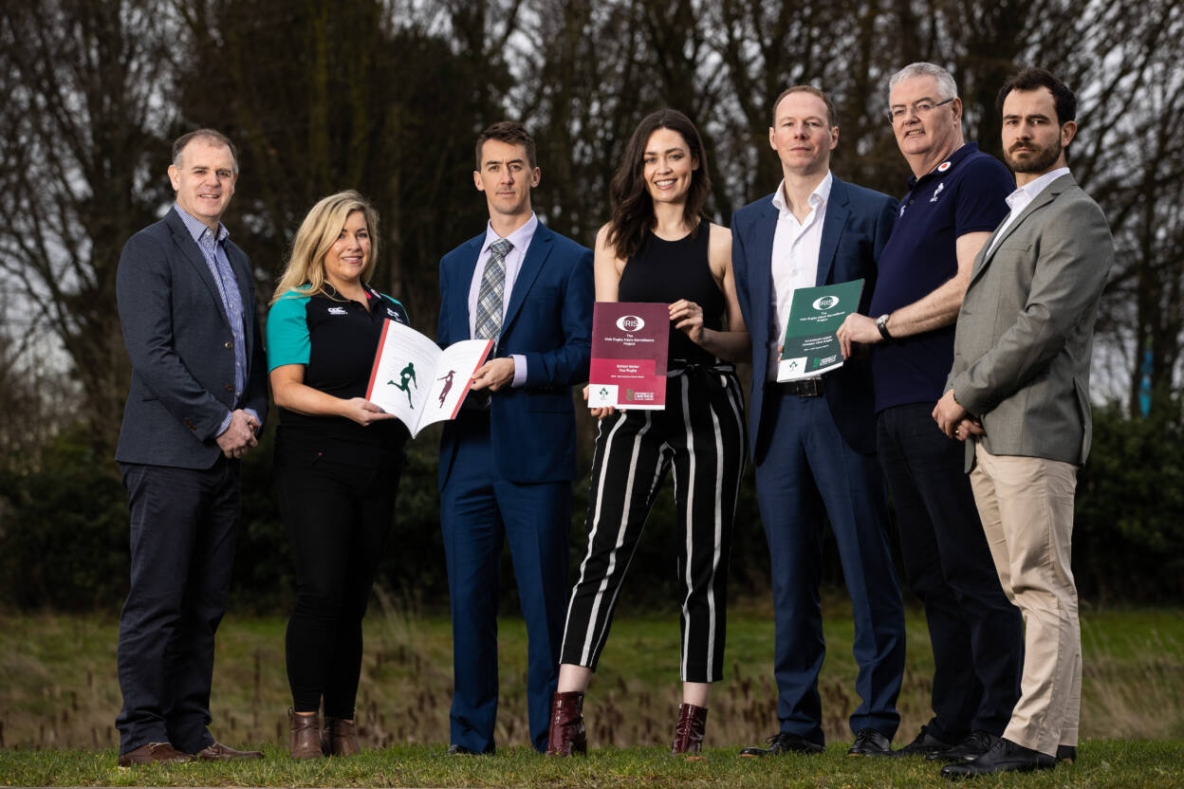
A University of Limerick research project looking at player welfare in rugby is the first study worldwide to investigate injury trends over time in the amateur women’s game.
The UL research team and the Irish Rugby Football Union have released the fifth year of findings from the Irish Rugby Injury Surveillance (IRIS) research project, investigating injury trends in the Men’s and Women’s All-Ireland League during the 2022/23 season.
The research collaboration was originally established in 2016 and was extended in 2022 for a further eight years. Funded by the IRFU, IRIS has expanded internationally to provide further insight into player welfare at all levels of the game.
The IRIS project has further developed their women’s injury surveillance and are currently investigating the impact of breast injury and pain in women’s rugby. It is the first study worldwide to investigate injury trends in the amateur women’s game longitudinally.
Injury surveillance in schoolboy rugby recommenced during the 2022/23 season, after two seasons where COVID-19 impacted schools’ rugby and the ability to monitor injury trends. IRIS increased recruitment across the schools’ game and now includes Leinster schools.
The IRIS surveillance system records the incidence, type, nature and severity of both match and training injuries occurring across the amateur game in Ireland. This information was a vital component of our decision to lower the tackle height and address tackle behaviour and informed the design of ENGAGE. These data will be used throughout the tackle behaviours trial to help accurately monitor injury trends before, during and after implementation of the law change.
The project is run at UL by co-principal investigators Dr Tom Comyns, Associate Professor and senior lecturer in human movement science at UL’s Department of Physical Education and Sports Sciences (PESS) and Professor Ian Kenny, Professor in Biomechanics in PESS.
Professor Kenny said: “The IRIS project involves research stemming from ongoing sports performance and injury prevention work by University of Limerick academics across a range of sports, as well as our specific expertise in Rugby Union. The IRIS group are working closely with the IRFU to use these data to answer pertinent questions for the game for example tackle height effect, ENGAGE injury reduction programme effects, and women’s game specific issues.”
Dr Comyns explained: “The longitudinal nature of the IRIS project has resulted in the project impacting on the practices within the amateur game in Ireland. The data collected has helped inform practice which aims to enhance player welfare. The support from the IRFU together with the clubs, schools, and players has been instrumental for the IRIS project and the research team thank all for their continued support and involvement.”
Dr Rod McLoughlin, the IRFU’s Medical Director, said: “The injury data provided by the IRIS Project informed IRFU discussions around tackle behaviours, and was a vital component in the IRFU decision to address the tackle behaviour in the domestic game and subsequently to opt into the World Rugby Global Tackle Height Trial. As we look towards the upcoming 2023/24 season, we will be able to accurately compare injury rates before and after the law change. These data allow us to better understand the impact of lowering the tackle height and improving tackle technique on injury rates, injury severity and injury mechanisms.
“We are encouraged to see the ongoing support from our clubs and schools working with the IRIS Project. Thank you to each and every club, school, data collector, volunteer, player and researcher that is part of this project. Your continued support is a fundamental component of how we protect player health and wellbeing.”
Latest findings:
Download the latest All-Ireland League amateur club rugby report
Download the latest Schools Senior Cup rugby report
The club data were compiled by researcher Patrick Dolan across 577 matches (versus 430 for 2021/22 season) from 26 Men’s and Women’s All-Ireland League clubs. In the schools game, data were compiled by researcher Lauren Guilfoyle across 191 matches from 14 Senior Cup Teams. A total of 878 male, 139 female players and 481 schoolboy players were registered with the IRIS project for the 2022/23 season.
Injury Frequency:
A male player, on average, would have to play 17 matches to sustain one injury (previously 14 matches). Injury incidence rate 43.3/1,000 player hours (down from 55/1,000 player hours).
A female player would have to play 25 matches to sustain one injury (same as previous season). Injury incidence rate 30.3/1,000 player hours (marginally up from 29.8/1,000 player hours).
A School Senior Cup player would have to play on average 22 matches to sustain one injury (previously 16). Injury incidence rate 38.5/1,000 player hours (down from 42.4/1,000 player hours in the 2019/20 season).
Senior Club Injury Event:
64% (men’s) and 71% (women’s) of match injuries are result of the tackle
45% (men’s) and 66% (women’s) of tackle related injuries sustained by the ball carrier
55% (men’s) and 34% (women’s) of tackle related injuries sustained by the tackler
Male Club Match Injury Occurrence:
9.1/1,000 player hours: concussion (up from 7.6/1,000)
5/1,000 player hours: ankle ligament sprain (down from 5.3/1,000)
4.7/1,000 player hours: hamstring strain (up from 4.6/1,000)
Female Club Match Injury Occurrence:
4.3/1,000 player hours: ankle sprains (up from 2.9/1,000)
3.7/1,000 player hours: knee sprains (up from 1.4/1,000)
2.5/1,000 player hours: concussion (down from 3.6/1,000)
School Senior Cup Match Injury Occurrence:
7.5/1,000 player hours: concussion (down from 9.6/1,000)
3.6/1,000 player hours: ankle sprain down from 4.1/1,000)
2.7/1,000 player hours: shoulder dislocation/subluxation (down from 7.2/1,000 – 2018/19)